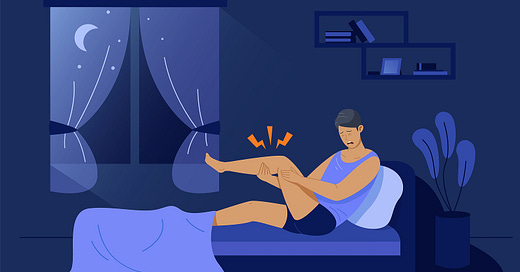Got a painful charley horse waking you up? Vitamin K2 is for you.
Nocturnal Leg Cramps can be alleviated.
Vitamin K is a fat-soluble vitamin involved in carboxylation that also activates several vitamin K–dependent proteins. In addition to its role in coagulation, vitamin K–dependent proteins impact vascular calcification and osteoporosis physiology.

Vitamin K comes in multiple forms but two, K1 nd K2, are dominant:

We now find a new role for the K2 subtypes.
Just out are the results of a clinical trial using vitamin K2 supplementation to reduce episodes of these leg cramps occurring at night.
A "charley horse" is an American term for a very painful involuntary cramp in the legs (usually located in the calf muscle) and/or foot, lasting anywhere from a few seconds to a couple days. Up to 60 percent of adults report that they have had nocturnal leg cramps.
A placebo controlled randomized clinical trial involving 199 participants 65+ years suffering with leg cramps, showed that those who received vitamin K2 when compared to the placebo group, experienced a significant reduction in the mean frequency of cramps per week.

DESIGN, SETTING, AND PARTICIPANTS This multicenter, double-blind, placebo-controlled randomized clinical trial was conducted in China between September 2022 and December 2023. This study used a volunteer sample comprising community-dwelling individuals 65 years and older with 2 or more documented episodes of NLCs during 2 weeks of screening. Researchers performed a history and physical screening of candidates recruited from the community through advertisements, and eligible participants were randomized in a 1:1 ratio to receive vitamin K2 or a placebo for 8 weeks. INTERVENTIONS Patients orally took capsules containing either vitamin K2 (menaquinone7), 180μg, or a similar-looking placebo everyday for 8 weeks. The study products were custom manufactured to have identical packaging and for the capsules to have matching appearance and identical excipients that shared similar taste and weight. MAIN OUTCOMES AND MEASURES The primary outcome was the mean number of NLCs per week between the vitamin K2 and the placebo group. Secondary outcomes included the duration of muscle cramps measured in minutes and the severity of muscle cramps assessed using an analog scale ranging from 1 to 10. RESULTS Among the 310 participants, 111 participants were excluded. Of the 199 enrolled individuals, 108 (54.3%) were female, and the mean (SD) age was 72.3 (5.5) years. A total of 103 patients (51.8%) were randomly assigned to receive vitamin K2 and 96 (48.2%) were assigned to placebo. The mean (SD) baseline weekly frequency of cramps was comparable in both the vitamin K2 group (2.60 [0.81]) and the placebo group (2.71 [0.80]). During the 8-week intervention, the vitamin K2 group experienced a reduction in the mean (SD) weekly frequency of cramps to 0.96 (1.41). Meanwhile, the placebo group maintained mean (SD) weekly frequency of cramps at 3.63 (2.20). The between-group difference was statistically significant (difference, −2.67; 95% CI, −2.86 to −2.49; P < .001). The vitamin K2 group had a more significant mean (SD) reduction in NLC severity (−2.55 [2.12] points) compared with the placebo group (−1.24 [1.16] points). The vitamin K2 group exhibited a more pronounced mean (SD) decrease in the duration of NLCs (−0.90 [0.88] minutes) than the placebo group (−0.32 [0.78] minutes). No adverse events related to vitamin K2 use were identified. CONCLUSIONS AND RELEVANCE. This randomized clinical trial showed that vitamin K2 supplementation significantly reduced the frequency, intensity, and duration of NLCs in an older population with good safety. TRIAL REGISTRATION ClinicalTrials.govIdentifier:NCT05547750
The between-group difference became significant beginning with the first week of the intervention.
Mechanism of Action is unknown.
Despite extensive research on the mechanisms by which vitamin K contributes to bone and cardiovascular health, the understanding of how vitamin K affects muscle remains limited. In vitro study provided a possible mechanism of the anticontraction effect of vitamin K. Vitamin K causes myometrial relaxation by inhibiting calcium intake from the external medium, an action mediated by blocking the voltage-dependent calcium channels and thus attenuating intracellular calcium levels in muscle cells. - J Tan, et al.
Sources There are four fat soluble vitamins: A, D, E and K. These can accumulate in adipose tissues, therefore overdosing to toxic levels is possible. It is best to include these vitamin rich foods in your daily diet.
Vitamins K1 and K2 come from distinctly different food sources:
Eating vitamin K2 containing foods for your bedtime snack would be wise. But also, take an inventory of your medications and look to see if they may be contributing to cramping. Rid yourself of any that are nonessential.


REFERENCES
Vitamin K2: Everything You Need to Know
Z Khalil, et al. The Medical Benefits of Vitamin K2 on Calcium-Related Disorders. Nutrients. 2021; 13(2):691. https://doi.org/10.3390/nu13020691
J Tan, et al. Vitamin K2 in Managing Nocturnal Leg Cramps: A Randomized Clinical Trial. JAMA Intern Med. Published online October 28, 2024. doi:10.1001/jamainternmed.2024.5726






